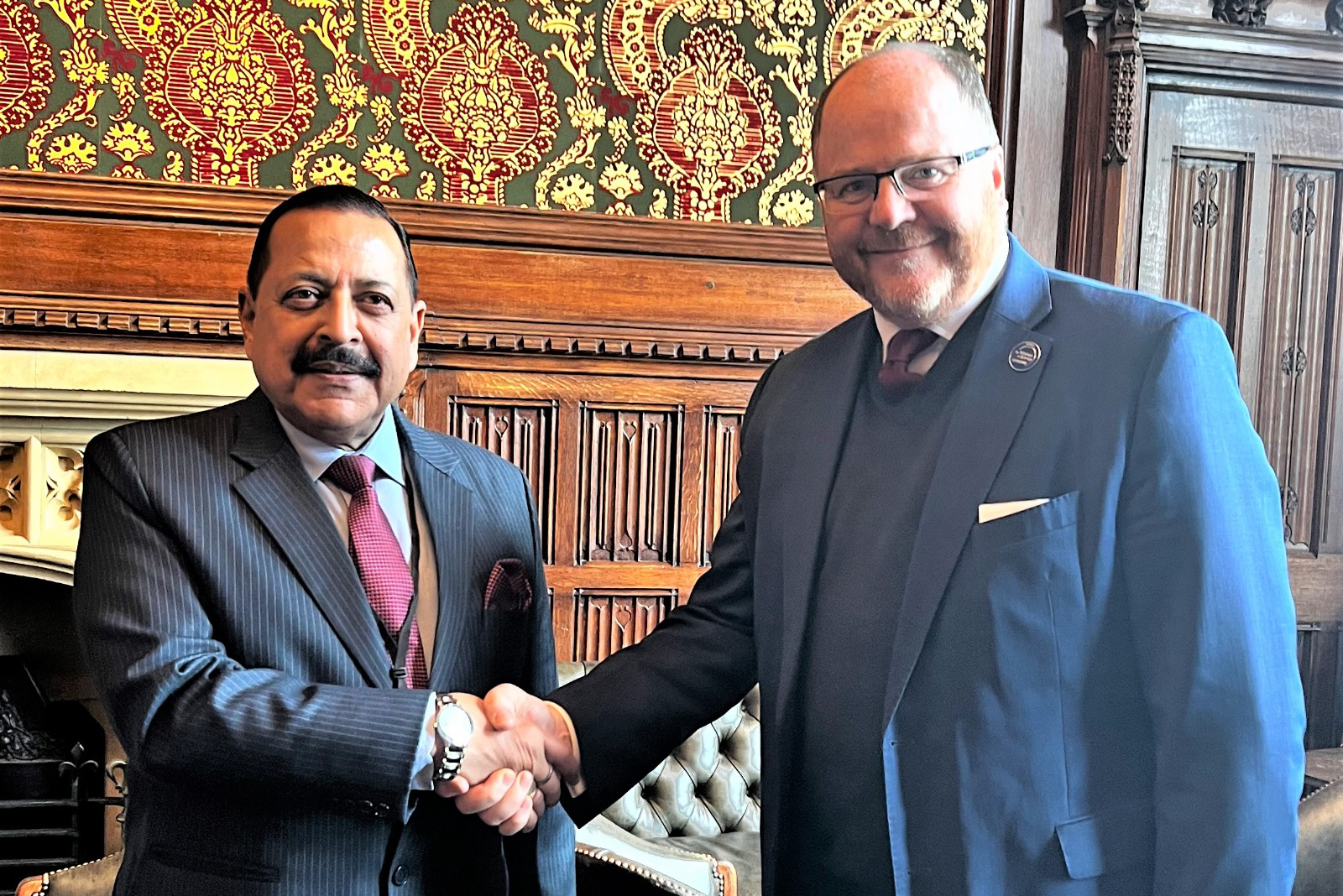
LONDON, April 26 : Union Minister of State (Independent Charge) Science & Technology; Minister of State (Independent Charge) Earth Sciences; MoS PMO, Personnel, Public Grievances, Pensions, Atomic Energy and Space, Dr Jitendra Singh today held a one on one meeting with the British Minister for Science, Innovation and Technology, George Freeman.
The wide range of issues discussed by the two Ministers included UK-India “Roadmap 2030”
Dr Jitendra Singh highlighted the close collaboration between the two countries strengthened through the ambitious ‘Roadmap 2030’ which was adopted by Prime Minister of India, Shri Narendra Modi and the Prime Minister of the United Kingdom, Rishi Sunak on the sidelines of the G-20 Summit in Bali. ‘Roadmap 2030’ provides a framework for UK-India relations across health, climate, trade, education, science and technology, and defence.
Dr Jitendra Singh congratulated the Government of the United Kingdom for formation of a new Department of Science, Innovation and Technology (DSIT) and said that it reflects the Government’s desire to place technology and innovation at the core of the UK economy.
Both the leaders agreed that an India UK technology partnership is central to the vision and prosperity today and for the future generations of both the countries.
Dr Jitendra Singh expressed satisfaction on the progress made since the last Science and Innovation Council Meeting held in New Delhi in July 2018. We could have met in 2020 but then the pandemic changed the whole dynamics, including changed priorities, he said.
The Minister said that even during the pandemic, both countries had a new and successful partnership on vaccines. The bilateral scientific cooperation has become truly multi-dimensional as India UK S & T partnership covers all aspects of Research and Innovation which is required for both nations to rise to new heights together, he added.
Dr Jitendra Singh said that he strongly believes that India can lead the newly industrialising countries in developing and adopting affordable technologies and processes, and demonstrate a growth path and low-energy consumption pattern that would be far more sustainable than that of the industrial countries.
The Minister recalled that during the last India-UK virtual summit held in May 2021, both the Prime Ministers had adopted an ambitious ‘Roadmap 2030’ that provides the framework for UK-India relations across health, climate, trade, education, science and technology, and defence. Prime Ministers from both countries emphasised their shared commitment to an enhanced partnership in science, education, research and innovation, he said.
Minister George Freeman said, he hoped that in today’s meeting, both leaders would be able to identify new cooperation opportunities for the scientific communities of India and UK to achieve the task given by the Prime Ministers of both countries.
Dr Jitendra Singh said that in India, the present Government has laid emphasis on promoting the value chain of innovation, entrepreneurship and IP generation. The Indian innovation system is more purpose driven rather than process driven with focus on affordability and accessibility. Make in India, Digital India, Clean India, StartUp India and Smart Cities initiatives of the current government provides a very fertile platform for us to engage and collaborate with the UK, he added.
The Minister mentioned that the India-UK Global Innovation Partnership (GIP) Programme is a great step to foster, transfer and scale up demonstrated and sustainable climate smart innovations from India to select developing countries with the ultimate aim of accelerating the implementation of Sustainable Development Goals (SDGs).
Dr Jitendra Singh said that in the recent past,Govt of India has,under the leadership of PM Narendra Modi, launched several flagship initiatives such as the National Mission on Interdisciplinary Cyber Physical Systems (ICPS); Quantum Computing and Communication; National Mission on Supercomputing, Electric Mobility, Green hydrogen etc. which provides new opportunities for collaboration.
Both the Ministers agreed on the fact that the global challenges we face today do not respect geopolitical boundaries and hence can be effectively addressed through scientific collaboration and not competition.
The Minister added that the Indian scientists are globally recognized for their research capabilities. But conversion of research into commercial technologies for wealth creation and lab to market transition is a challenge the country needs to face head on.
Dr Jitendra Singh said he hoped that the partnership for the joint research leading to development of commercially viable products, processes or services would provide greater returns, in terms of economic and societal benefit to the common man and on money spent by the two governments on R&D.
Minister Freeman concluded by saying that he is looking forward to deliberations with the Union Minister Dr Jitendra Singh during his visit to the UK on how both countries can focus on making S&T cooperation mutually beneficial with stronger economic impact for their citizens.

